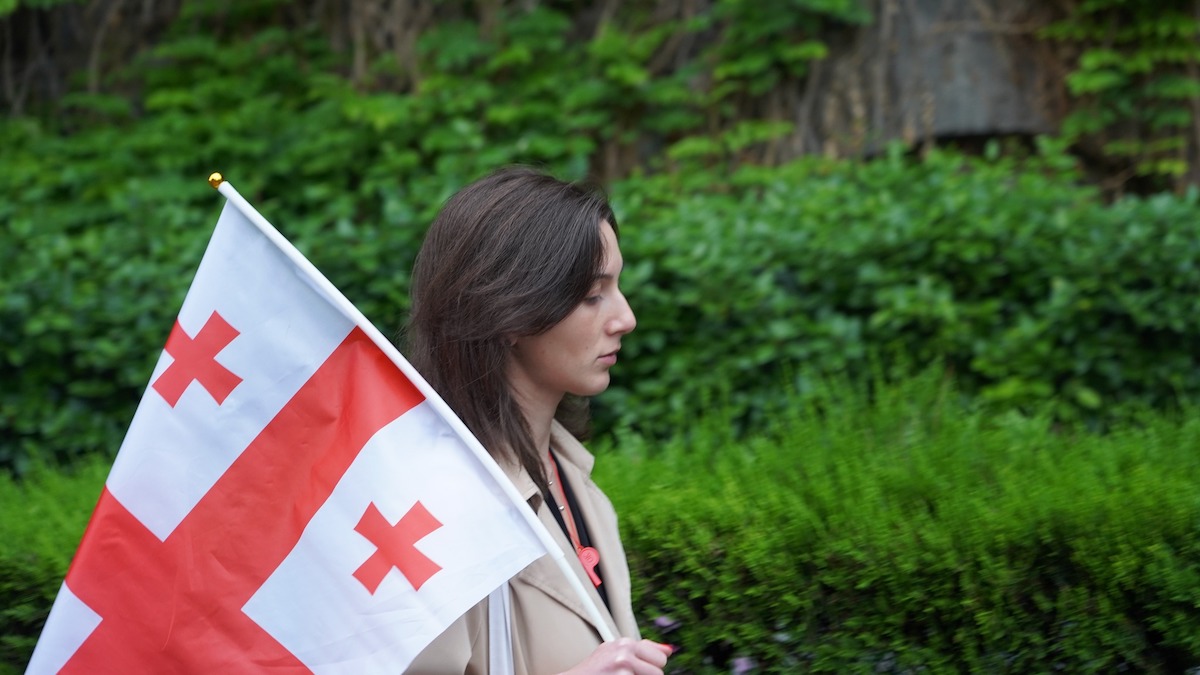The President and part of the opposition in Georgia will challenge the "foreign agents" law in the Constitutional Court
“Foreign agents” law challenged in court
Georgian president Salome Zourabichvili and a segment of the opposition plan to challenge the controversial “foreign agents” law, passed by the country’s parliament in May 2024, in the Constitutional Court. Lawsuits demanding the suspension of the law and its eventual annulment will be filed at the end of July.
Presidential parliamentary secretary Giorgi Mskhiladze stated that this marks the first instance of a Georgian president filing a lawsuit in the Constitutional Court. According to him, the “foreign agents” law (“On Transparency of Foreign Influence”) contradicts Article 78 of the Georgian Constitution.
In 2017, an amendment was made to Article 78 of the Georgian Constitution concerning the “integration of the country into European and Euro-Atlantic structures.” According to this amendment, constitutional bodies must take all necessary measures within their powers to ensure the full integration of Georgia into the European Union and the North Atlantic Treaty Organization (NATO).
Here’s what Tamar Kordzaya, leader of the opposition platform “Unity,” who intends to file her own lawsuit in the Constitutional Court alongside the president, commented on the situation:
“It’s very good that the president is initiating this process today, but it is important that not a single segment, not a single part of this law remains unchallenged, because this law leaves no room for freedom for anyone in this country.
Another important aspect is that we also demand the use of a temporary mechanism that provides for the suspension of the law’s effect until a final decision is made. For this, it is necessary for the Constitutional Court to convene quickly and hold a discussion on the suspension of the law.“
Similar lawsuits are planned to be filed in the Constitutional Court by several non-governmental organizations. Additionally, the civil sector intends to lodge a complaint with the European Court of Human Rights (ECHR).
What’s important to know about Georgia’s ‘foreign agents’ law?
- The “Law on Transparency of Foreign Influence” was initiated by the ruling party “Georgian Dream” and passed by Parliament in its third reading on May 28, 2024.
- The Parliament adopted this law despite massive protests, persistent calls from Georgia’s Western partners, and the opinion of the Venice Commission of the Council of Europe.
- After the passage of the law, the US announced the first package of sanctions against the “Georgian Dream” government. Secretary of State Antony Blinken warned of a “comprehensive review of US-Georgia cooperation.”
- The European Union also took retaliatory measures. In early July, the EU halted €30 million in aid to Georgia and warned of additional measures to come. Senior EU officials have repeatedly indicated that this law distances Georgia from the EU.
- On July 11, the U.S. House Committee on Foreign Affairs passed the Megobari Act, which imposes sanctions on those involved in passing the “foreign agents” law.
The Georgian government’s main argument is that similar laws exist in the U.S. and several European countries, including France. According to Georgian Dream, every country has the right to protect itself from foreign influence and demand transparency from its organizations.
However, this comparison is inaccurate because:
The American law FARA (Foreign Agents Registration Act), to which Georgian Dream refers, was enacted in the U.S. in 1938, before World War II, and aimed to protect the American public from Nazi propaganda. Neither then nor now did FARA apply to America’s allies and friendly countries.
In France, the law on “Foreign State Influence” includes a specific list of countries to which the law applies. This list comprises countries whose influence France considers a threat, including Russia, China, Turkey, and Iran. The French version also specifically states that this law does not apply to EU countries. The Georgian version lacks such provisions. Consequently, this law directly impacts organizations funded by the U.S. and the EU—friendly and partner countries that support democratic processes and numerous vital projects in Georgia, ranging from healthcare and infrastructure to strengthening civil society.
Furthermore, FARA stipulates that the law does not apply to media or NGOs, only to lobbying organizations. The Georgian version does not have this clarification.
Overall, the Georgian law is similar to the Russian law, which primarily affected media and the NGO sector. As a result, all non-governmental and media organizations not controlled by the Kremlin have been shut down in Russia. Hence, the Georgian law has been dubbed the “Russian law.”
It’s also important that this law contradicts EU legislation. When a similar law was adopted in Hungary, it was annulled by the European Court of Human Rights because it was directly aimed at silencing the media and oppressing NGOs.
The “Law on Transparency of Foreign Influence” in Georgia is set to come into effect by September 2024 when a special registry will be ready for “foreign agent organizations” to register. This applies to all organizations where over 20% of funding comes from foreign grants. In a small and not very wealthy country like Georgia, this includes the vast majority of non-governmental organizations.
Many Georgian NGOs and media refuse to register in the registry as they find the label of “organizations representing the interests of foreign states” offensive. “We work honestly in our country, so why should we be called ‘bearers of foreign state interests’?” they protest.
Some small organizations are already announcing their imminent closure. For instance, the NGO Fair Trees Foundation reported that its project to create a free children’s dental clinic would be suspended due to the law’s adoption.
Additionally, almost all animal protection organizations in Georgia rely on foreign grants, and thus the law’s adoption could lead to the closure of many of these organizations.



















